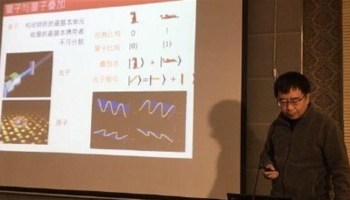 |
Suspicious activity: A photo taken from Penang
social activist Anil Netto's blog showing an active stone quarry about
500m directly behind the site of the landslide.
|
GEORGE TOWN: As the landslide tragedy takes its toll with three workers killed and 11 others feared dead, DAP state assemblyman Teh Yee Cheu said there are still 10 other development projects pending, but his plea to save the hills has been constantly ignored.
Some of the projects will be near hillsides and more are planned along the coastline. A few are projected to be 50 to 60 storeys high, said the Tanjung Bungah assemblyman.
“I objected to each one. I always use the words Saya membantah sekeras-kerasnya (I strongly object) and some city councillors laughed at me and said the approval authority ‘menyokong sepenuh-penuhya’ (fully supports).
“Now see what has happened,” Teh told The Star.
He was referring to the one-stop centre at the Penang Island City Council (MBPP), which is in charge of approving property development plans on the island.
Teh, who rushed to the scene of the landslide shortly after it happened at about 8.30am yesterday, did not hide his discontent over the spurt of development projects in his constituency.
“Not all those development applications have been approved yet.
“But after the general election, I expect a mushrooming of approvals,” he added.
Tanjung Bungah is one of the few residential areas on the island with a low population density.
The Lembah Permai area, locally called Hillside or Vale of Tempe, is a coveted location for its semi-detached, terraced and bungalow homes.
But in recent years, developers have been submitting plans for high-rises that rival even the height of Komtar, in the area’s unoccupied hills and seaside.
Yesterday’s landslide happened at a construction site near Lorong Lembah Permai 3.
Tens of thousands of tonnes of laterite earth slipped down from a height of about 35m, burying the workers.
Firemen told reporters that the search operation had to be carried out slowly because the slope was unstable.
Teh said he objected to the project’s planning permission about two years ago because the original hill slope had a steepness of 30 to 40 degrees.
“I apologise to my voters in Tanjung Bungah. I objected to the construction, but my words were only taken as a personal view by the MBPP and state government.
“I also apologise to the family members of the victims buried by the landslide,” he said.
Asked about a stone quarry located some 500m further uphill from where the landslide occurred, Teh said that it was active, with rock blasting going on two to three times a week.
“I am against that too, but it was allowed to continue,” he added.
Source: The Star
 Another call to stop all hill-slope development immediately
Another call to stop all hill-slope development immediately
Why must it take a tragedy to happen in Penang before the Penang state and local governments wake up to the dangers of rampant and unsustainable development especially on hill slopes? Or will they wake up?
Two years ago, in December 2015, the Penang Forum, alarmed by such negative developments, organised a half-day event titled “Save Our Hills” in which engineering, planning and legal experts gave presentations on the dangers of hill-slope development. (The presentations are available on Penang Forum’s website.)
It then called on the government to review and stop further hill-slope projects. Very sadly, the call fell on deaf ears and the consequences are painfully evident today after an estimate of perhaps 15 lives are lost in a landslide at a hill-slope project in Tanjung Bungah.
Penang Forum then started Penang Hills Watch (PHW), a citizens’ initiative to provide the state government, information on hill cuttings that it collects from the public. In January 2017, the PHW met with the state government; the present site where this tragedy happened was the first case that PHW highlighted to the state government. (Please visit the PHW website.) Photos of construction and hill cutting on this site were presented to the state government – to which it responded that the “earthwork is being monitored.”
The chief minister of Penang, in the Safety Guidelines for Hillside Development, said: “Penang Local Governments (MPPP and MPSP) are to strengthen their Geotechnical unit, which processes and approves applications for hill site developments, followed by strict enforcement. A monitoring team will be established to ensure compliance in construction and monitoring performance of slopes.”
The question is what happened then? Did the state and local governments follow through their own guidelines? Or was there gross negligence?
Such senseless tragedy could have been avoided. Penang Forum calls for an independent Royal Commission of Inquiry to investigate what went wrong and how such incidents can be avoided in the future. All parties beginning from the State Planning Committee that gave approval for all hill-slope projects, to the One-Stop-Committee of the Penang Island City Council that also approved the project, to the engineers who are supposed to monitor the projects, to the developers and contractors who carried out the project should be investigated and held responsible.
In the meantime, Penang Forum once again calls on the authorities to:
- stop all hill-slope projects with immediate effect;
- immediately amend the 2009 guidelines on ‘special projects’ to explicitly prohibit all development on hill lands, except if it is for essential public services;
- rehabilitate all existing exposed and barren slopes and spaces to prevent further soil erosion;
- undertake stern enforcement, effective and deterrent punishment on those who clear land illegally or do not abide by conditions imposed to prevent soil-erosion;
- monitor frequently and effectively all hill slopes by the local authorities;
- publicly declare and give warning on all hill slopes and areas that are not safe.
Sources: Penang Forum
Sahabat Alam Malaysia
Consumers Association of Penang
Residents associations and management committees of Penang
Related Links:
www.thestar.com.my/.../tanjung-bungah-landslide-penang-forum-highlighted-cases/
Will fatal landslide spur state to protect hills?
Groups call for RCI to investigate tragedy
Missing supervisor transferred recently
DOSH and construction board to probe cause of landslide
Three bodies pulled out, 11 workers still buried in rubble
Consumers & Residents tell state govt, ‘We told you so’
https://youtu.be/znzduuH8Soc
GEORGE TOWN: The Tanjung Bungah Residents’ Association (TBRA) is demanding for a Royal Commission of Inquiry (RCI) on all hill slope developments in Penang, following a landslide at a construction site this morning that buried nearly 18 people.
TBRA chair Meenakshi Raman said the RCI would be a form of audit on all risky hill slope projects in the state, to prevent any tragedies from happening again.
She also said the TBRA had repeatedly appealed to the Penang government to put an end to hill slope developments as it would have a domino effect on flash floods in the state.
“We were called ‘irrational’ by the Penang government when we appealed for hill slope developments to stop. Who’s irrational now?
“Today’s incident is a grave and grim warning to the authorities to take heed of Mother Nature’s warning,” Meenakshi said when contacted today.
In the 8.50am incident, a 10m-high hill slope came crashing down next to a construction site not far from the Tunku Abdul Rahman College in Tanjung Bungah.
At the time of writing, two survivors were rescued, while two more bodies were retrieved from the mud and rubble. Although their identities are not yet known, they are believed to be foreign workers.
Meenakshi said during last month’s flash floods, TBRA and other residents’ associations made a collective appeal to the state government to end all excess developments and hill clearing in the state.
TBRA, concerned groups, and Sahabat Alam Malaysia (SAM) had also previously called on the Penang government to amend existing guidelines concerning hill slopes.
Meanwhile, SAM president S M Mohamed Idris said the NGO had written to the Penang government “several times” urging them to stop hillside developments.
“We have warned that hill slopes are fragile ecosystems and cannot be touched.
“And now, we are really shocked that the lives of many have been sacrificed. We support TBRA’s call for an urgent RCI,” he said when contacted.
Source: Free Malaysia Today
Related
Sixth body pulled out from Penang landslide heap
Related Links:
Will fatal landslide spur state to protect hills?
Groups call for RCI to investigate tragedy
Missing supervisor transferred recently
DOSH and construction board to probe cause of landslide
Three bodies pulled out, 11 workers still buried in rubble
Related posts:
Some representatives of the 24 residents
associations and management corporations showing messages urging the
state to resolve the flood is...
IJM hill clearing & Trehaus construction damaged nearby houses since 2014 must be mitigated quickly!
Behind BJ Cove houses at Lintang Bukit
Jambul 1 is an IJM Trehaus Project. Approximate Coordinates :
5°20'38.47"N,100°16'...






















 Malaysia Toray Science Foundation (MTSF) - Winning ways with Science creations
Malaysia Toray Science Foundation (MTSF) - Winning ways with Science creations 
























